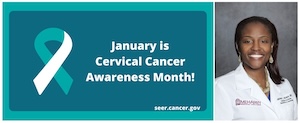By Mylika Scatliffe
AFRO Women’s Health Writer

January is Cervical Cancer Awareness Month and if nothing else, Dr. Jamie Ware wants women to remember that unlike many other cancers, cervical cancer can be prevented.
“There is a screening test to detect cervical cancer and with regular screening at the proper intervals, we can take measures to diagnose and treat the dysplastic cells before they become cancerous,” said Ware.
The pre-cancer stage of cervical cancer makes it somewhat unique. By the time other cancers are diagnosed, the cancerous cells have developed into full-blown cancer. With cervical cancer there is dysplasia, or abnormal cells which have not yet progressed to cancer, and they can be treated.
Most adult women at some time in their lives have had conversations about the dreaded annual pelvic exam, commonly known as the PAP smear. Dreaded though it may be, it is one of the easiest and quickest methods of preventive screening for women to endure. Dysplasia can be detected with a PAP smear.
The Centers for Disease Control and Prevention (CDC) reports that in 2020 there were an estimated 604,000 new cases of cervical cancer and 324,000 deaths from cervical cancer throughout the world. All women are at risk, but data shows it occurs most often in women over the age of 30. Human papillomavirus (HPV) is an extremely common family of sexually transmitted viruses that causes almost all cervical cancers.
Most individuals under the age of 30 can clear the virus on their own, but some infections last longer, and in addition to cervical cancer it can cause cancer of the vagina, vulva, penis, anus or the back of the throat, called oropharyngeal cancer. Oropharyngeal cancer includes the base of the tongue and tonsils.
“Certain risk factors like smoking, multiple sexual partners, and a compromised immune system can increase the chance of re-exposure to HPV, or a different strand of the virus which can lead to a progression or resurgence of abnormal cells,” said Ware.
There are over 100 different strains of HPV.
In addition to proper screenings, cervical cancer can be prevented with the HPV vaccine. Vaccination can begin at nine years of age, but the CDC recommends two doses of HPV vaccine between the ages of 11 and 12. The vaccine is most effective when it is given prior to exposure to the virus and before becoming sexually active but is still recommended if a person has already been exposed. The HPV vaccine is approved by the Food and Drug Administration to be given up to the age of 45, and the CDC recommendation is that everyone through age 26 years get the HPV vaccine if not already fully vaccinated.
Unfortunately, Black people and other people of color may have increased barriers to obtaining care– which includes cervical cancer screenings.
“Historically, women are the primary caregivers in their families and communities. This leads to women putting themselves last and not prioritizing their health,” said Ware.
There are other barriers for Black women when it comes to caring for their reproductive health. Financial constraints. Lack of insurance or underinsurance. Even lack of provider availability.
The current political implications surrounding health care for women as well as the high malpractice risk means there are geographical areas where a dearth of providers exists.
“Many doctors are opting not to enter this area of practice,” said Ware.
As a provider of color, Ware believes it is her responsibility to dispel myths and encourage open and honest dialogue around these topics, and to encourage women to prioritize themselves.
“Reproductive and sexual health are often taboo, particularly in the Black community. Early in my career I became interested in the social aspects of educating teens in particular; I wanted them to have a better understanding of their bodies, how it functions and how to care for it,” said Ware.
“That is what I enjoy about gynecology; we see women from each era of life from adolescence into their mature senior years. I really appreciate the opportunity to care for women across all those spectrums,” Ware continued.
To that end, Ware cannot emphasize enough the importance of preventive care when it comes to cervical cancer.
“The current recommendations for cervical cancer screenings, or PAP smears, are every three years beginning at age 21 for a woman of average risk. By age 30, a woman can do co-testing, which is a PAP smear and HPV test. If they are both negative, and she remains of average risk, she can be screened every five years,” said Ware.
There is also a high-risk test for HPV that an individual can get every five years beginning at age 25. It is FDA approved but not yet readily available.
“In this instance high-risk refers to high risk strains of the HPV virus, not an individual’s high-risk behaviors or personal characteristics,” said Ware.
If a woman receives abnormal results, then she and her provider will decide what pathway to consider in terms of future screening and treatment.
What are the signs/symptoms of cervical cancer?
· Bleeding during or after sexual intercourse.
· Abnormal bleeding.
· Changes in menstrual cycle including prolonged bleeding, heavy bleeding, and more than one menstrual cycle per month.
If a woman experiences any of these symptoms, she should see her doctor at once.
Ware encourages women to have honest and forthright conversations with their providers about cervical cancer and their general reproductive health.
“Don’t be afraid to inquire about all of your options for treatment and caring for your health. Lack of insurance doesn’t have to be a barrier for obtaining screenings and treatment. Your local health department is a good place to inquire about resources if you are underinsured or have no insurance,” said Ware.
For Ware, cervical cancer awareness means remembering that with proper screenings, it can be prevented.
The post Meet Dr. Jamie Ware, the woman advocating for more cervical cancer education and preventive screenings appeared first on AFRO American Newspapers.











